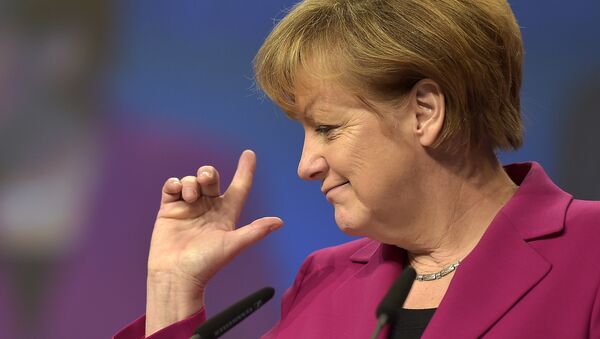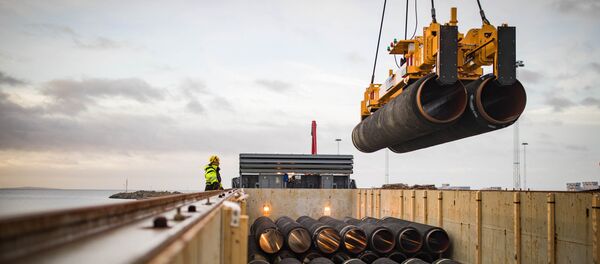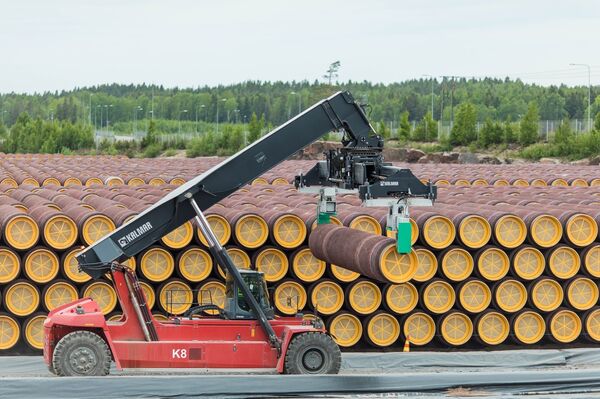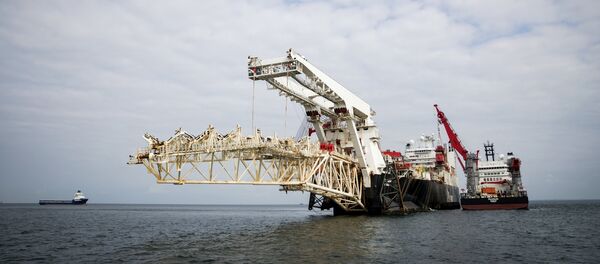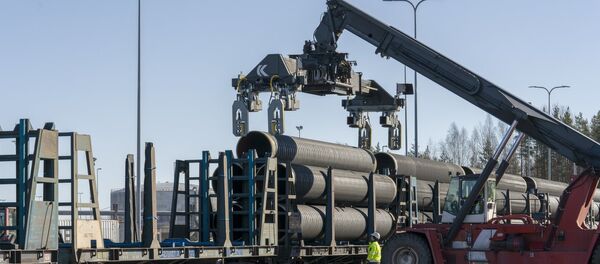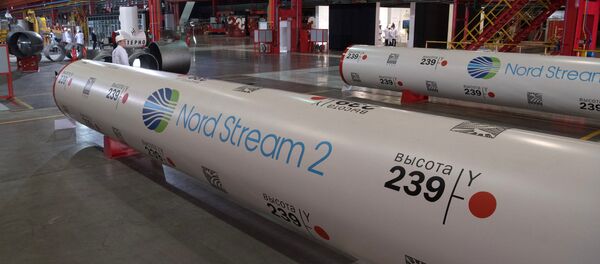US Vice President Mike Pence "issued a warning" to Berlin over German Chancellor Angela Merkel's efforts to protect the Nord Stream 2 endeavour at the Munich Security Conference, according to Die Welt. In response, Merkel reportedly signalled concerns over "the prospect of further hardball tactics from the Trump administration".
How far could Washington go with its threats?
"Washington's threats against Germany are a sign of weakness," Daniele Pozzati, a Munich-based Italian journalist and political observer, told Sputnik. "Washington's weakness boils down to this: the US cannot risk an open confrontation with Germany, because any such confrontation would speed up Berlin's rapprochement with Moscow".
Indeed, the Trump administration has repeatedly dropped hints that it could impose restrictions on European companies involved in the Russian-led endeavour under the Countering America's Adversaries Through Sanctions Act (CAATSA), inked by the US president into law on 2 August 2017.
"Talks of introducing sanctions against German businesses… could ignite talks of ending sanctions against Russian businesses," Pozzati opined. "What's more, Trump is very unpopular in Germany. You know what is [the Germans'] favourite line? 'We have bought Russian gas since Soviet times, in the middle of the Cold War, and everything went well — why should we stop now?'."
The journalist drew attention to the fact that the Trump administration "had opened too many fronts, and they are struggling to deal with them all: Venezuela, Iran, Syria, Ukraine, etc." He pointed out that there is already a silent conflict between the US and EU over Iran "with Brussels trying to defy Trump's new sanctions against Tehran".
"There just isn't room for yet another confrontation, in form of a commercial war, against Germany," the observer suggested. "Because this is what stopping Nord Steam 2 and introducing tariffs against German autos would amount to — an act of commercial war".
Why US' 'Bill From Hell' Doesn't Target Nord Stream 2
Commenting on Mendenez' remark, Pozzati suggested that Washington does not want to mess up with Berlin, "because Germany, as the EU's leading country, is key to US hegemony over Europe".
"Make a deal with Germany, and you know it will be imposed on the rest of Europe. Whom could the US rely upon in Europe, once their ties with Germany are compromised beyond a certain point? With Macron's France? With post-Brexit UK? Or with an increasingly eurosceptic Italy?" the journalist asked rhetorically.
According to Pozzati, "during Obama's years, a tacit deal was made between Washington and Berlin, in which Germany would surrender its foreign policy (Ukraine, Syria, etc.) to the US, in exchange for the US opening its markets to top-quality, but outrageously cheap, German goods — here, a German-run Euro has been kept low to help German exports".
"We know Trump is trying to implement protectionist policies in line with his electoral platform," the observer said. "We know he is not happy with Germany's gargantuan trade surplus. But it's not that you can easily re-negotiate long standing economical arrangement just by sounding threats and 'warnings'. Especially if your priority really isn't to stop a new pipeline but rather — as it has been the case over the past 150 years — to prevent too close a partnership between Germany and Russia".
Nord Stream 2: 'Berlin Will Find Ways to Impose Its Will on EU'
On 18 February, Kommersant, a Russian newspaper, reported that the Nord Stream 2 gas pipeline may remain underutilised for at least several years due to the latest amendments to the EU Gas Directive which give the European Commission leverage over the energy project. According to the newspaper, the draft may be adopted by the EU as early as on 20 February.
According to Pozzati, Berlin "will find ways to impose its will on the EU, as it does routinely".
The journalist presumed that the reported EU directive "might indeed cause some delay, but not several years", as "Berlin still has enough room de manoeuvre once the new EU gas directive is approved on Wednesday Feb 20th".
Pozzati believes that the European Commission (EC) is by no means interested in throwing sand in Germany's gears.
"An open confrontation between the European Commission and Germany over Nord Stream 2 is even less likely than one between the US and Germany," he opined.
Pozzati noted that although Macron is seemingly "not happy" with the Russian-European pipeline, Germany commands support from a number of European states — including the Netherlands, Belgium, Austria, Greece and Cyprus — and may also engage Italy "should the need arise to corner Paris over the full implementation of Nord Stream 2".
"And whom will Paris turn to, to stave off German pressure? It will have nowhere to turn to. It will bow to German will, just as it has done ever since Macron was elected president," the Italian journalist said.
Nord Stream 2, an offshore natural gas pipeline, is an extension of the existing Nord Stream route. It is designed to increase the overall annual capacity of Russian energy supplies to Europe to 110 billion cubic metres (3.9 trillion cubic feet). The Gazprom-led project was conceived in October 2012, while in April 2017, the pipeline's operator, Nord Stream 2 AG, signed financing agreements with major European energy companies — Engie, OMV, Royal Dutch Shell, Uniper, and Wintershall.
The views and opinions expressed by the speaker and the contributor do not necessarily reflect those of Sputnik.

